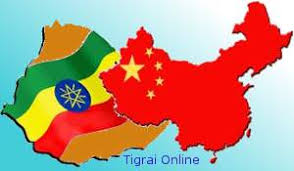Ethiopia: China Positive On Ethiopian Investment Despite Some Concerns
It has not been hard to spot red spherical
lanterns with yellow tassels around Addis Abeba in the last two weeks.
These decorations have been put up in areas where Chinese businesses are
located, to mark the nation's New Year.
The abundance of such lanterns in Ethiopia's capital is perhaps a testament to the increasing Chinese presence in Ethiopia, especially in the business sector.
There are 415 Chinese companies that have taken out licences between August 27, 1998 and October 16, 2012, according to data from the Ethiopian Investment Agency (EIA). However, this figure includes companies who have packed up and left.
China is the topmost export and import trading partner of Ethiopia, and its foreign direct investment (FDI)to the country has grown to 58.5million dollars in 2010, according to a World Bank survey published in November 2012.

Direct Investment from China to Ethiopia
The stock of FDI from China to Ethiopia was 58.5 million dollars while the total Chinese FDI stock reached 403 million dollars in 2010. Out of the 413 Chinese companies operating in Ethiopia, 69pc are owned privately.
Currently, South Africa, Nigeria and Zambia are the highest receivers of Chinese FDI in Africa, which totaled 12 billion dollars in 2011. A survey was conducted by the World Bank in May 2012 at the request of the Ethiopian government, who wants to actively compete for the inflow of FDI from China.
Heeding the request, the World Bank conducted a 95 question survey on 71 Chinese companies investing in Ethiopia and used the data of all but two to make recommendations.
Most of these companies first heard of the investment climate in Ethiopia through the Chinese social network already established here. Families; relatives and friends which are already established in Ethiopia, provide information and bring in additional FDI. As a result nearly all of the Chinese companies surveyed are from three provinces, Zhejiang, Liaoning and Fujian.
Data collected from these companies, of which 45 are in the manufacturing sector; 13 in the construction and transportation sectors and 11 in the service sector, reveals that the political stability of Ethiopia and the growing economy are major attractions for Chinese firms.
The abundance of such lanterns in Ethiopia's capital is perhaps a testament to the increasing Chinese presence in Ethiopia, especially in the business sector.
There are 415 Chinese companies that have taken out licences between August 27, 1998 and October 16, 2012, according to data from the Ethiopian Investment Agency (EIA). However, this figure includes companies who have packed up and left.
China is the topmost export and import trading partner of Ethiopia, and its foreign direct investment (FDI)to the country has grown to 58.5million dollars in 2010, according to a World Bank survey published in November 2012.
Direct Investment from China to Ethiopia
The stock of FDI from China to Ethiopia was 58.5 million dollars while the total Chinese FDI stock reached 403 million dollars in 2010. Out of the 413 Chinese companies operating in Ethiopia, 69pc are owned privately.
Currently, South Africa, Nigeria and Zambia are the highest receivers of Chinese FDI in Africa, which totaled 12 billion dollars in 2011. A survey was conducted by the World Bank in May 2012 at the request of the Ethiopian government, who wants to actively compete for the inflow of FDI from China.
Heeding the request, the World Bank conducted a 95 question survey on 71 Chinese companies investing in Ethiopia and used the data of all but two to make recommendations.
Most of these companies first heard of the investment climate in Ethiopia through the Chinese social network already established here. Families; relatives and friends which are already established in Ethiopia, provide information and bring in additional FDI. As a result nearly all of the Chinese companies surveyed are from three provinces, Zhejiang, Liaoning and Fujian.
Data collected from these companies, of which 45 are in the manufacturing sector; 13 in the construction and transportation sectors and 11 in the service sector, reveals that the political stability of Ethiopia and the growing economy are major attractions for Chinese firms.
No comments:
Post a Comment